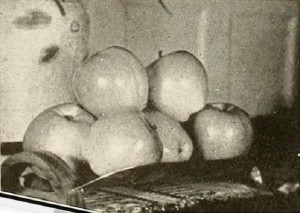"Film features trees and leaves, ducks, water, a statue, 2 women wearing coats, a bridge and some house-like structures. The garden was filmed in the spring/summer and fall" Archives of Ontario.
"Along Utah Trails shows Utah scenery, including Hayden's Peak and Mirror Lake." University of Utah Marriott Library.

"Most movie makers look about for suitable music for a picture, only after it has been completed. Herman Bartel, who produced Awakening, scores his films just the other way around. He listens to a composition that he likes until he thinks of picture material that will express its mood. Since Mr. Barters appreciation and selection of music are above reproach and since his ability to take a camera and a roll of film and make them sing is well known, we can only add that this is his finest film to date. It is very difficult to explain a Bartel picture. You can say that the subjects are flowers, trees, animals and the other common manifestations of nature, but what you must see to believe is that they have never been filmed in quite his way before. Mr. Bartel does not use parts of records and change from one to another with abrupt shifts in themes. Instead, he uses each record in full. In this film, the blend of picture and music is so matched that, in some scenes, reeds and bushes sway to the rhythm of the music. Needless to say, the camera work in this picture is superb. Other color films may be exposed as well, but they will never be exposed better because here is more than perfect exposure and lighting. Mr. Bartel has taken what existed and has made it say what he wanted it to say through skillful control of the devices at hand." Movie Makers, Dec. 1942, 489, 506.

"Blossom Forth the Fruit is a straightforward, well made, carefully planned and well exposed instructional film, which tells how to care for apple trees and their fruit in all stages of growth. Its maker, William R. Hutchinson, has a thorough knowledge of apple growing, and he also had the collaboration of specialists from Cornell University and the Farm Bureau. The clear presentation of all the phases of treatment that are necessary to insure the growth of fine fruit is noteworthy. From the technical point of view, microscopic color studies of insects, parasites and blights furnish excellent examples of ultra closeup technique. Methods of spraying and other protective treatment of the fruit are shown in clearly presented detail. Because of its clear presentation and uniformly high technical quality, this film is worthy of the highest commendation." Movie Makers, Dec. 1941, 564-565.
"This film shows the Kegg family stripping basswood and birch barks and using the bark to make baskets and canoes." Worldcat.org
"How Pine Trees Reproduce has some exciting scenes and some little known information on a subject few of us know much about. It could be a dull film, but Dr. Harlow's skill with camera and scissors has produced a most informative result" PSA Journal, Sept. 1964, 51.
Imágenes del bosque / Images of the forest.
This film was produced at some time in the 1950s.
"Shows children at a sugar bush in Ontario in springtime." Library and Archives Canada.
"'Moods of Nature' by Paul Brunford, recently won a prize in the Institute of Amateur Cinematographers' contest in England. Not only does Brunford show a fine sense of rhythm, but a keen eye for composition and a splendid sense of cutting and dramatic values in nature. This picture merely deals with a storm arising and then subsiding. Brunford uses both water and earth to show this. The smashing waves, bending trees and waving wheatfields combine to create his drama. His photography however, is something for which he is to be especially congratulated." American Cinematographer, Jan. 1936, 24.
Total Pages: 3